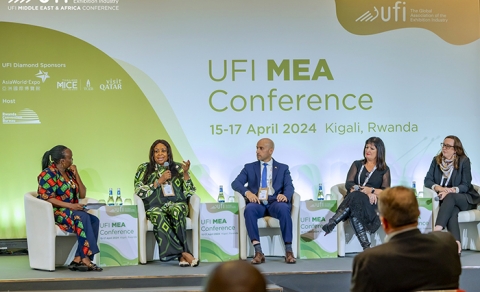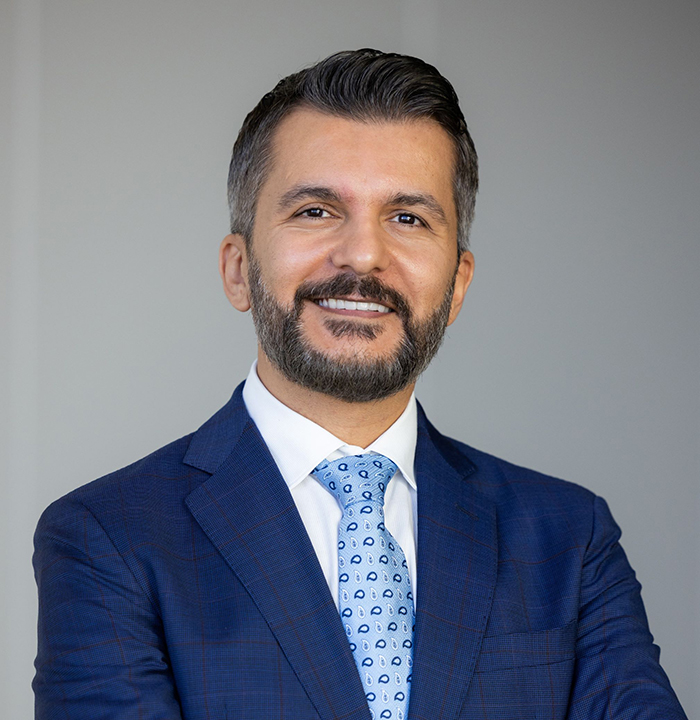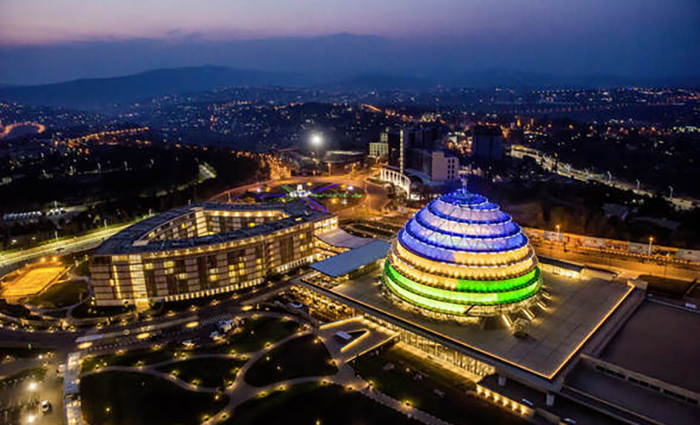What’s Trending in Exhibitions in the Middle East & Africa: Q&A With UFI’s Naji El Haddad
May 1, 2024

What’s the state of the exhibition industry in the Middle East and Africa (MEA)? In a TSNN exclusive, we interviewed Naji El Haddad, regional director of MEA for UFI, the Global Association of the Exhibition Industry, to get the scoop on the annual in-person Regional Conference, held April 15-17 at the Kigali Convention Centre in Rwanda.
Serving in his role for more than five years, El Haddad shared his insider’s view on what’s trending in the region for exhibitions.
Here are excerpts from our conversation. Watch or listen to the full interview here.

- Key markets for exhibitions in the region: In terms of the biggest markets, the Gulf is doing well. Notably, the UAE is the largest single market. Saudi Arabia is gearing up for a big growth. Qatar as well. They hosted the world cup among other large-scale events, including the Web Summit, the Geneva Motor Show, for example. When it comes to Africa, South Africa is the biggest single market. Egypt is still a big market with 120 million people, and Morocco, Algeria and Tunisia also have big market sizable venues and a good number of events.
- Regional outlook: Saudi Arabia represents today the highest growth in terms of new business opportunities. UAE continues to be the leader in terms of number of exhibitions and sizes of exhibitions. One of the challenges in the region, besides the unrest, is the talent. We need to upscale our talent.
- MEA UFI Chapter: We count 66 members, who represent around like 7% or 8% out of the total of UFI membership that has grown to 860 members from 80-plus countries. The majority of our members are organizers, venues and convention bureaus and tourism boards.
- Why Kigali: The way we select the destinations for our regional conferences is they submit a bid to host. There are a set of requirements they need to fulfill. The Rwanda Convention Bureau, our host, offered everything that a conference would be looking for. At UFI, our mandate is to support the rising economies and destinations. Rwanda is one of those exciting destinations in our region, and we hosted the MEA regional conference in Africa.
- The venue: It was a very nice and very convenient venue because it was like a compound at the Kigali Convention Center and the hotel, which is Radisson Blu. They are under the same management, and it's a gated area so you feel safe. It's super green and super clean. Our delegates enjoyed it so much because there was so much daylight and so much greenery. Many of the delegates went in the morning or the evening for a run or walk within the compound. It is close to the Kigali airport, less than 20 minutes.

- Challenges for exhibitions in Africa: Africa is a very big continent and divided into at least three or four regions. One of the major challenges in Africa was venues. The lack of big venues restricts the possible accommodation of large events. For example, dmg CEO Geoff Dickenson said that for one show in Africa they had to build multiple tents that are four times the size of the original venue. There is a need for new venues and with this comes investment opportunities.There is a potential for big shows to thrive in Africa.
- Talent development in Africa: The second challenge that was highlighted is international experience. There is no issue, of course, with finding talent in Africa. Over 50 percent of Africa's population is within the youth age bracket, but international experience may be needed. This is where education programs, such as Certified Professional or Exhibition Management School or other association programs are needed in the country.
- Changing dynamics: We spoke about leaders of the future and how women can apply for jobs in leadership. Obviously, there are challenges, but the key takeaway is that professionals should stand up and should apply for these jobs without having the pre-thought that “I will not be accepted because this role might go to man.” The dynamics are changing. The landscape is changing, but it will take some time, as the experts agreed. One interesting fact about the UFI program is 45% of our speakers were females.
Don’t miss any event-related news: Sign up for our weekly e-newsletter HERE, listen to our latest podcast HERE and engage with us on LinkedIn!
Partner Voices

MGM Resorts is committed to fostering an inclusive and diverse culture, not just among employees and guests but also within its supply chain. The company prioritizes procuring goods and services from businesses owned by minorities, women, veterans, people with disabilities, LGBTQ individuals and those facing economic disadvantages. This commitment is integral to MGM Resorts' global procurement strategy.
Through its voluntary supplier diversity program, MGM Resorts actively identifies and connects certified diverse-owned suppliers to opportunities within its supply chain. The company is on track to spend at least 15% of its biddable procurement with diverse-owned businesses by 2025, demonstrating that supplier diversity is not only a social responsibility but also a strategic business imperative.
Supplier diversity isn’t just the right thing to do – it’s good for business. A diverse supply chain allows access to a broader range of perspectives and experience, helping to drive innovation, entrepreneurship and resilience, while strengthening communities. At MGM Resorts, engaging diverse suppliers ensures best-in-class experiences for guests and clients. Supplier diversity ensures a more resilient supply chain while supporting economic development in the communities in which it operates.
The impact of MGM Resorts' supplier diversity initiatives is significant. In 2023, these efforts supported over 3,500 jobs across more than 30 states, contributed over $214 million in income for diverse-owned businesses and generated more than $62 million in tax revenue. The story extends beyond the numbers – it reflects the tangible benefits brought to small and diverse-owned businesses, fostering economic empowerment in their communities.
MGM Resorts also supports the development and business skills of diverse-owned businesses through investment, mentorship and education. Through the MGM Resorts Supplier Diversity Mentorship Program, the company identifies, mentors and develops diverse-owned businesses to fill its future pipeline, while providing businesses with tools and resources to empower and uplift. Since 2017, the program has successfully graduated 105 diverse-owned businesses and is on track to achieve its goal of 150 graduates by 2025.
MGM Resorts’ commitment to supplier diversity not only enhances its business operations but also plays a crucial role in uplifting communities and fostering economic development. This approach reinforces the idea that diversity is a powerful driver of innovation and resilience, benefiting both the company and the wider community.

Add new comment